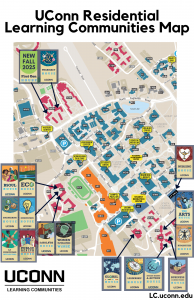- Can I apply to live in a Learning Community if I plan to Study Abroad in the Spring?
- Where on campus are the Residential Learning Communities located?
Is there an additional housing cost associated with living in a Learning Community?
No, you will pay the same rate for your room as listed on the Campus Housing website.
When will I be notified whether I have been accepted into a Living & Learning Community?
- Returning Students: Typically early to mid March
- New Students: Those who apply before May 1 will be notified prior to the start of New Student Orientation in May
What are expectations for students living in a Learning Community?
Learning Communities provide an environment where students will approach a topic in a unique way with a group of students who share an interest. Students can select a topic that mirrors their major, or one completely different to round out their educational experiences at UConn. The success of a Learning Community depends on the active and positive participation of all the students living together.
Students living in a Learning Community earn course credit by completing a required course or course cluster together in the Fall and Spring semester. In addition, students may be required to serve on committees within their community and participate in events, activities, and/or trips.
Learning Communities provide a fun way to learn, make close friends, network with people, and participate in programs and opportunities across campus and beyond! Students often remark that their LC feels like a family rather than just a floor.
Will living in a Learning Community limit my college experience?
No! In fact, Learning Communities are meant to enhance your experience and help connect you with opportunities and resources that otherwise would be difficult for you to discover on your own in your first year on a large campus. Engaging in Learning Community courses connect you with UConn faculty and staff who are interested in your academic and social success. They can help you find ways to make the most of your time in college, starting in your first semester!
Students say they feel a sense of belonging to a close-knit community that is supportive, and they still have all the freedoms of other students living in the Residence Halls around them. They are able to make friends all over campus and pursue other interests.
How much of a time commitment will living in a Learning Community require?
Students devote time to taking a course or a course cluster together, and they participate in events, activities, and/or trips throughout the year. Students may also serve on committees in their community (such as Public Relations Committee, Social Committee, etc.) and/or complete service-learning activities. Some events are required and others are optional. You will still find time to commit to your academic studies, to hold down a job, to pursue other interests, and to have fun!
Can I request a roommate who does not apply to live in the Learning Community (LC)?
This is not possible. Students in Learning Communities can room with another person accepted to the same LC. This is because our goal is to fill each LC which occupies one or more floors in a Residence Hall on campus. We encourage students to go random in their first year!
Can I apply for more than one Living/Learning Community?
Students are not able to apply for more than one Living/Learning Community. However, most LCs are open to students beyond their first year. So, you could apply to live in one LC for one year and then another the following year.
If there is a non-residential Learning Community for your major, you can enroll in the 1-credit class, and also apply for a Living & Learning Community.
Can I apply to live in a Learning Community if I plan to Study Abroad in the Spring?
Yes. We hope you stay in touch with your UConn friends while you are traveling abroad.
Where on the main campus in Storrs are the Living/Learning Communities located?
Residence Halls and Dining Halls are located around the perimeter of campus with academic and service buildings in the center. Learning Communities are located in several Residence Halls around campus.
What are Non-Residential Learning Communities?
These are 1-credit major- or program-based FYE (First Year Experience) courses that students in the same major enroll in during their first semester. The course is taught by a professor or advisor from the major, and it is designed to provide students with information about career paths and opportunities within the field. Students meet peers who share their major which provides a network of support during their college years, and beyond.
Students do not apply to participate in a non-residential Learning Community. Some majors are automatically enrolled in the corresponding UNIV 1810 FYE course, while others have limited space, so students must enroll early to participate. New students can enroll in one of the UNIV 1810 FYE courses during New Student Orientation.
